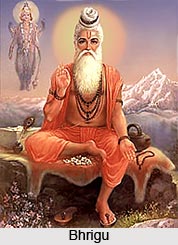 Authorship of Atharva Veda has been classified into two groups of sages known as the Atharvanas and the Angirasa. Later it has been attributed to the Bhrigu and Angirasa. It has also been ascribed to other sages such as Kausika, Vasistha and Kasyapa. Its two surviving branches are known as Saunakiya and Paippalada. Authorship of Atharva Veda has been attributed to a sage named Atharvan. This text was not composed by him alone. Some major hymns have been composed by him. In Rig Veda he is mentioned as one who knows how to create fire. Creation and preservation of fire is among the ancient technologies of the pre-historic people.
Authorship of Atharva Veda has been classified into two groups of sages known as the Atharvanas and the Angirasa. Later it has been attributed to the Bhrigu and Angirasa. It has also been ascribed to other sages such as Kausika, Vasistha and Kasyapa. Its two surviving branches are known as Saunakiya and Paippalada. Authorship of Atharva Veda has been attributed to a sage named Atharvan. This text was not composed by him alone. Some major hymns have been composed by him. In Rig Veda he is mentioned as one who knows how to create fire. Creation and preservation of fire is among the ancient technologies of the pre-historic people.
Sage Angiras has also been credited of having composed some parts of Atharva Veda. Angiras is also considered as the surname and many sages used this surname. Sage Angirasa is associated with fire along with Atharvans and Bhrigus. In fact Atharvangirasa is used as an alternate name for Atharva Veda. However later it was reduced to `Atharva`.
It has also been considered that the name `Atharvangirasa` indicated a single person who belonged to the Angirasa branch of the Atharvan sages. There is also a possibility that the branches of the Bhrigus and that of the Angirasas, originated from the single tribe of the Atharvans. Therefore there is a possibility that an Atharvan of Angirasa branch initiated the tradition of Atharva Veda. This was later abandoned by the Angirasa and took over by the Bhrigu sages.
According to the the Gopatha Brahmana, a later-Vedic text, Atharva Veda`s authorship is attributed to sages Bhrigu and Angirasa. This indicates that the lineage of Bhrigus and the Angirasas was derived from the ancient Atharvan sages. However in later stages it is seen that Angirasas distance themselves from their Atharvan ancestry. The Bhrigus continued with their ancestral Atharvan traditions.
Black magic has been ascribed to Angiras, whose name is related to Agni, the divine messenger. Atharvan, another author derives from the old Iranian root, `atar `that means fire. Bhrigu, third author was considered as the name of a tribe which opposed Sudas in the battle of ten kings in the Rig Veda. The fourth author is Brahman, the name which has been assigned to the Atharvan priest.



















